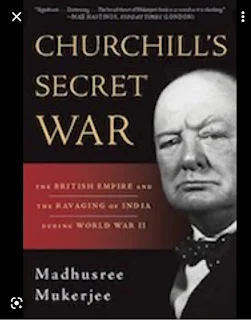Churchill's Secret Wars (2010)
(The British Empire and the Ravaging of India during WW2)
Author: Madhusree Mukerjee
Author: Madhusree Mukerjee
In 1952, Nehru appeared on BBC TV in his first ever TV appearance. He was invited to the UK to partake in the coronation of Queen Elizabeth II. As the head of a former colony of the Crown, Nehru was there, standing shoulder-to-shoulder with Winston Churchill, gracing the event. By that time, Churchill had descended from his intense contempt for all races except whites. Churchill must have been brimming from ear to ear as India and many other former colonies had consented to stay under the umbrage of the Crown under the title of the Commonwealth. If two hundred years of looting of wealth from India was insufficient, now their subjects have agreed to make their wealth common!
No wonder the current generation of Indians want to re-evaluate and re-write their history, not from the viewpoint of the conquerors but the conquered. As the African proverb goes, "Until the lions have their historians, tales of the hunt shall always glorify the hunter."
The events surrounding the systemic state-sponsored persecution and mass murder are constantly reminded to the world. The word 'Holocaust' is almost synonymous with the killing of six million Jews by Nazis during WW2. The world has not been fed about the repeated famine-related deaths that the Jewel in the Crown of the British Raj had to endure to enrich its colonial masters and his countrymen were well fed.
In 1950, Winston Churchill embarked on a journey to write the history of the perilous times of the 20th century. He wanted to ink his legacy of how he defended his tiny island nation and shouldered the burden of her mighty empire. His six-volume just conveniently forgot to mention Bengal's 1943 famine which engulfed nearly 700,000 lives by modest colonial estimates and up to 5 million, according to village scribes and academics.
It was a heartless inhumane strategy to sacrifice the perceived lesser human race to safeguard and feed the Europeans. When Churchill was repeatedly told about Bengal's humanitarian crises, he blamed the malady squarely on the Indians for breeding like rabbits.
In reality, it was the British's elaborate plan to impoverish and weaken the Indians. It constituted part of its strategy to defeat the enemies of the Allied Forces. Just as there was the threat of the Japanese from India's eastern borders, the British scorched all the rice fields. The produce, however, was shipped off to feed the Allied soldiers. Then there was the subsequent smuggling, hoarding and spiralling of food prices. Farmers who fed the nation instead died of hunger. There was no plan whatsoever on the part of the British to rectify this. In fact, the efforts by the local British representatives were thwarted by Churchill. To Churchill, it was imperative to feed hungry Europeans than some brown people. In Churchill, rationing of food to the British was unthinkable. At no time during WW2 did the UK have any food shortage. Famine was endemic in India all through the British Raj rule. Approximately 15 million died from 1850 to 1899 in 24 major famines.
Mother Nature had not been to the Bengal region. Before this famine, there was a devastating monsoon. Then there was the heavy taxation. And the British scorched the fields to prevent the Japanese from getting their food supply. Shipments of food supply from the US, Canada and Australia scheduled to arrive in India never made it.
"I hate Indians. They are a beastly people with a beastly religion. The famine was their own fault for breeding like rabbits." -Winston ChurchillChurchill always tries to put the narrative that Hindus are an uncouth race. The enlightened followers of the Abrahamic faith stand to be oppressed in an Independent India if India was a free nation. With the increasing debt accumulated because of WW2 and lopsided trade practices that impoverished the Empire, Britain had let go of its colonies. The India that Britain encountered 200 years previously was submissive and easily conquerable. It was like that no more. Initially, Gandhi and his passive resistance to demanding self-rule worked just fine. It was India's death wish, and the British easily thumped their boots on the resisting freedom fighters. The coup de grâce came as a mutiny of the British Indian Navy after the trial of captured Indian National Army prisoners of war in Delhi.
Jinnah and his band of born-again Muslims decided to play their victim card that people of the Muslim-dominated areas in India would be treated as second-class citizens in an independent India. They started demanding a piece of land to be carved out of India to call their own, a new true blue Islamic country named Pakistan. The British thought it was a jolly good idea too. The rest is history.
This book results from years of meticulous research into many de-classified British documents. It concentrates mainly on Churchill's mishandling of the 1943 Bengal famine and eventual Partition. The author's point is that he intensely disliked the non-white race. His actions indicate that he was stuck in his Victorian mindset. He felt that the white race was superior and it was the white man's burden to civilise and govern over the rest. Churchill's handling of the famine can border on negligence or criminal by today's standard. Despite all these, the world puts Churchill on a pedestal, hailing him as a true statesman and a great leader.






No comments:
Post a Comment